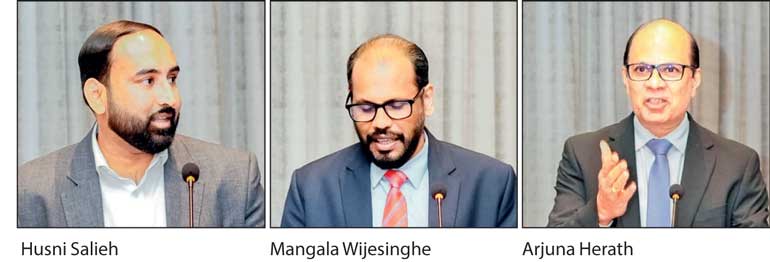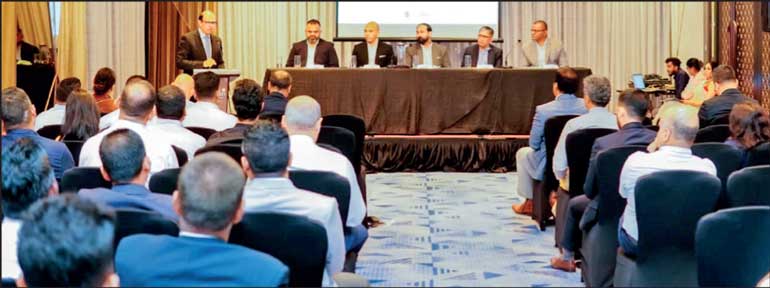Wednesday Feb 25, 2026
Wednesday Feb 25, 2026
Wednesday, 1 October 2025 00:02 - - {{hitsCtrl.values.hits}}



Fabric and Apparel Accessory Manufacturers Association (FAAMA) held its Annual General Meeting recently, with Husni Salieh of Noyon Lanka appointed as the new Chairman. He will be supported by Vice Chairmen Niroshan Samarasinhe of Stretchline Ltd., and Shahid Sangani of Dynawash Ltd.
The Chief Guest at the event was Board of Investment (BOI) Chairman Arjuna Herath, while Export Development Board (EDB) Chairman and CEO Mangala Wijesinghe graced the occasion as Guest of Honour.
FAAMA represents a diverse membership of key suppliers to the apparel export industry, including manufacturers of fabric, lace, zippers, elastics, bra cups, and packaging materials, etc. In support of Sri Lanka’s ambition to build a robust backward supply chain, the sector has made significant investments in local manufacturing capabilities. Today, FAAMA members contribute close to $ 1 billion in direct and indirect exports and play an essential role in value addition, which currently exceeds 55% in the apparel industry.
In his address, outgoing Chairman Samal Dissanaike raised the growing concerns of his members regarding the impact of the new VAT Act and the scheduled withdrawal of the Simplified VAT (SVAT) system on 1 October. He also stressed on the point that both the BOI and EDB should make every effort to look after the interests of the exporters and the supply chain in the country if the Government’s ambitious export growth targets are to be met in the future.
Dissanaike highlighted two major implications for FAAMA members. Firstly, significant amounts of cash would now be tied up in VAT payments to the IRD as payment for any particular month would now be due on or before the 20th day of the following month. He pointed out that given most companies have their prior agreed customer settlement credit periods of 60, 75, 90 days, etc., the system change would further strain working capital issues and increase financing costs.
Secondly, local suppliers risk becoming less attractive compared to direct imports sourced by apparel manufacturers as this method would prevent their cash being blocked with IRD for a minimum 45-day period. If this trend catches on the locally sourced portion of approx. $ 1 billion could drastically reduce and could also hamper employment in the country in the future.
FAAMA has been in continuous dialogue with both the EDB and BOI on this matter, seeking an equitable resolution.
Export Development Board (EDB) Chairman and CEO Mangala Wijesinghe, while acknowledging the concerns raised by Dissanaike emphasised that FAAMA should focus on Free Trade Agreements (FTAs) already available and try to boost exports. He also mentioned of ongoing efforts for a new FTA with Japan.
Also addressing the gathering, BOI Chairman Arjuna Herath indicated that the Inland Revenue Department (IRD) is giving positive consideration to the inclusion of indirect exporters in the “eligible exporter” category. He emphasised that such a move would be critical to sustaining operations and ensuring the continued viability of businesses within the sector.
With the removal of the SVAT scheme just days away, exporters remain anxious about the IRD’s readiness to process refunds efficiently — a delay that could pose significant challenges to industry cash flow.
However, Herath’s remarks offered FAAMA members a glimmer of hope.